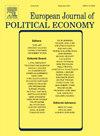The impact of income inequality on public environmental expenditure with green consumers
IF 2.4
3区 经济学
Q2 ECONOMICS
引用次数: 0
Abstract
This article analyzes the impact of income inequality on environmental policy in the presence of green consumers. We first perform an empirical analysis using a panel of European countries over the period 1995–2021. The results show a negative relationship between inequality and public environmental expenditure, which is weaker with higher inequality. We also find a negative correlation between environmental expenditure and green consumption, that highlights the substitutable nature of the relationship between the two variables. We next develop a model with two main ingredients: citizens with different income capacities have access to two commodities that differ in terms of environmental impact, and they vote on the environmental policy. In equilibrium, the population is divided into two groups, conventional vs green consumers. An increase in inequality raises the marginal cost of policy through size and composition effects. The higher the equilibrium tax, the larger the overall effect. This provides us with an explanation of the main empirical result.
收入不平等对绿色消费者公共环境支出的影响
本文分析了在绿色消费者存在的情况下,收入不平等对环境政策的影响。我们首先使用1995-2021年期间的欧洲国家面板进行实证分析。结果表明,不平等与公共环境支出呈负相关关系,且不平等程度越高,这种负相关关系越弱。我们还发现环境支出与绿色消费之间存在负相关关系,这凸显了两个变量之间关系的可替代性。接下来,我们开发了一个包含两个主要成分的模型:不同收入能力的公民可以获得两种环境影响不同的商品,他们对环境政策进行投票。在均衡中,人口被分为两组,传统消费者和绿色消费者。不平等的加剧通过规模和构成效应提高了政策的边际成本。均衡税越高,整体效果就越大。这为我们提供了对主要实证结果的解释。
本文章由计算机程序翻译,如有差异,请以英文原文为准。
求助全文
约1分钟内获得全文
求助全文
来源期刊

European Journal of Political Economy
Multiple-
CiteScore
3.40
自引率
10.00%
发文量
106
期刊介绍:
The aim of the European Journal of Political Economy is to disseminate original theoretical and empirical research on economic phenomena within a scope that encompasses collective decision making, political behavior, and the role of institutions. Contributions are invited from the international community of researchers. Manuscripts must be published in English. Starting 2008, the European Journal of Political Economy is indexed in the Social Sciences Citation Index published by Thomson Scientific (formerly ISI).
 求助内容:
求助内容: 应助结果提醒方式:
应助结果提醒方式:


